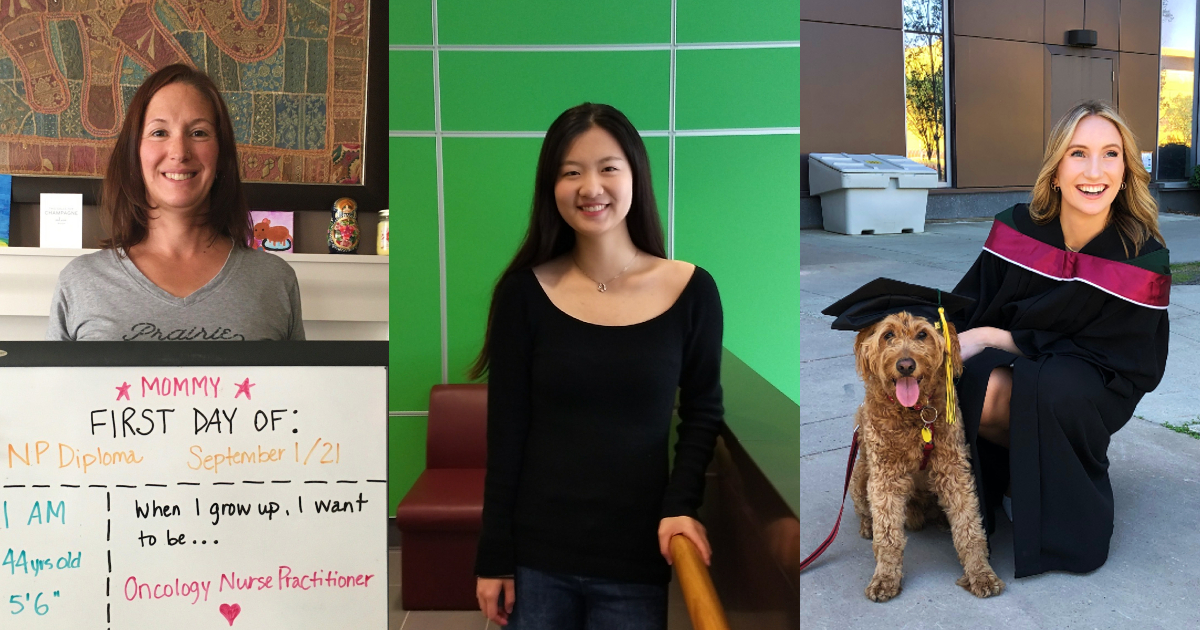Updated nursing graduate program provides flexibility and an emphasis on research
Jon Pullin - 5 December 2022

Master of Nursing students Tammy Patel, Lily Lu and Danielle Lysak. Photos supplied.
The University of Alberta’s master of nursing program was updated two years ago to provide students with both online flexibility and a renewed focus on research skills, and the results have been positive.
Master of nursing students select one of four areas of focus that include education, leadership, research and advanced clinical-nurse practitioner (leading to licensure as a nurse practitioner).
Core courses in each stream were updated to reflect the knowledge and skills required for advanced practice and evolving health-care trends. The new courses have an emphasis on research and inquiry skills, systems complexity and diverse ways of knowing.
“Our graduates must have a strong ability to systematically explore and analyze nursing and health issues,” explains Dianne Tapp, associate dean of graduate studies in the Faculty of Nursing. “They need to be able to understand the results of studies, be capable of performing advanced inquiry and research, and apply systems-level thinking to tackle important questions.”
“Our new curriculum embraces and encourages research and problem-solving skills as a core area of competency for advanced practice nurses in clinical, leadership and teaching roles.”
Students take a series of courses that guide them through building research and capstone projects, from proposals to completion by the end of the program. The topics students address reflect current issues in nursing practice and health-care systems.
The new curriculum better prepares graduates to meet the health-care needs of Indigenous persons and communities and provides more flexibility for working registered nurses to complete graduate studies.
Students in the nurse practitioner stream can now complete their entire course component online and perform practicums in or near their home communities. This allows nurses from rural areas or outside Alberta to be admitted as nurse practitioners, which has resulted in a dramatic increase in graduates from the program.
The refreshed education and leadership streams now use a mix of online and in-person learning, accommodating life schedules for working students.
“The pivot to hybrid teaching has greatly increased accessibility for working nurses to complete our graduate programs,” states Tapp. “Around 50 per cent of our master's students study on a part-time basis while having nursing jobs. Feedback from both faculty and students has been very encouraging.”
Nurse practitioner student Tammy Patel was able to apply to the program without moving to Edmonton.
“I was very attracted to the U of A program because of the remote learning aspect, as I live in Calgary. It was also one of the few programs that offered the specialization in adult populations and a post-master’s nurse practitioner option,” says Patel.
“My favourite part of the program has been making new friends and learning all the different areas of expertise for nurse practitioners. Forming relationships is an important part of becoming a successful nurse practitioner since we’re such a small profession.”
Lily Lu, also a nurse practitioner student, says she was attracted by the U of A nursing faculty’s high rankings and reputation in the world for both teaching and research, as well as the remote learning option.
“The online option gave me the opportunity to do coursework at my own pace while keeping my part-time job as a nurse,” says Lu. “I have met and collaborated with so many amazing health-care professionals since starting my program. It really helped me build confidence about sharing my clinical knowledge with interdisciplinary team members.”
Research stream student Danielle Lysak has glowing reviews for the program’s emphasis on building research skills.
“This program has opened so many opportunities for me. I’m in a position to be a valuable asset to a research team because of my education. I know how to develop and interpret research to better promote evidence-based practice. I have the tools to solve problems in my workplace. I’ve also been exposed to positions in health care I never knew existed,” says Lysak.
Associate dean Tapp adds that now is the time to think about graduate studies.
“Re-energize your passion for nursing as you lean into the future challenges that lie ahead, and retool your nursing knowledge and skills as you learn more about how to navigate through the continuing changes in health care. Your graduate studies will nourish and sustain your vision for nursing,” says Tapp.
Patel recommends students start their applications early.
“Be prepared to spend time creating a strong application because the nurse practitioner program is highly competitive. Start early, like six to 12 months in advance, gathering information for your application. It takes time to gather reference letters, write essays and develop a CV. Watch for webinars about applying and most importantly, ask for help if you need it.”
Revive your passion for nursing by pursuing your master’s or doctorate degree. Gain the credentials needed for positions in advanced nursing, education, leadership and/or research training while you continue to work. Apply for Fall 2023: uab.ca/ngp